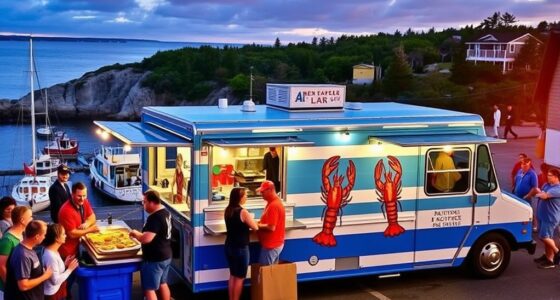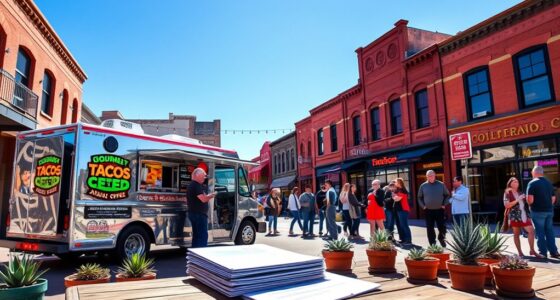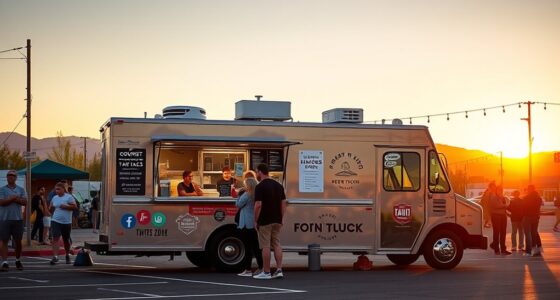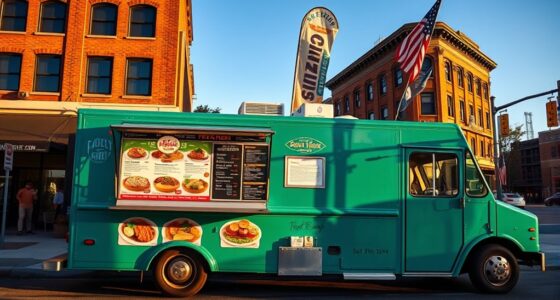To start a food truck in Salem, Oregon, you’ll need permits like a Mobile Food Units license and a food service license, along with zoning approvals for your chosen location. Expect costs for the truck, equipment, permits, and licenses to range from $40,000 to $150,000. You’ll also need to guarantee your menu complies with safety standards, select legal spots to operate, and develop a solid marketing plan. If you keep exploring, you’ll discover how to navigate each step smoothly.
Key Takeaways
- Obtain necessary permits and licenses from Salem City and Oregon Health Authority, including mobile food unit and zoning approvals.
- Budget for startup costs such as truck purchase ($40,000-$150,000), equipment, permits, and initial inventory.
- Secure private property or approved public locations through property owner agreements and zoning compliance.
- Develop a compliant menu based on food truck classification, ensuring safety and sanitation standards are met.
- Use digital marketing, participate in local events, and maintain a strong online presence to attract customers and grow your business.
Navigating Permit and Licensing Requirements in Salem

Are you ready to start your food truck business in Salem? First, you need a Mobile Food Service or Mobile Food Establishment License, which must be visibly displayed on your truck at all times. Before operating, you’ll also need a specific Food Truck Permit, with fees listed online. Expect inspections from Environmental Health Officers for health and fire safety, and notify the Salem Fire Department of your operating times and locations for pre-inspections. Additionally, you must obtain a Mobile Food Unit License from the Oregon Health Authority, valid for one year, and ensure compliance with local and county regulations. The licensing process is overseen by city authorities and involves submitting complete applications and passing plan reviews. Keep track of renewal deadlines to stay compliant and avoid delays. Understanding licensing procedures and requirements can help streamline your application process and ensure timely approval.
Estimating the Costs to Launch Your Food Truck
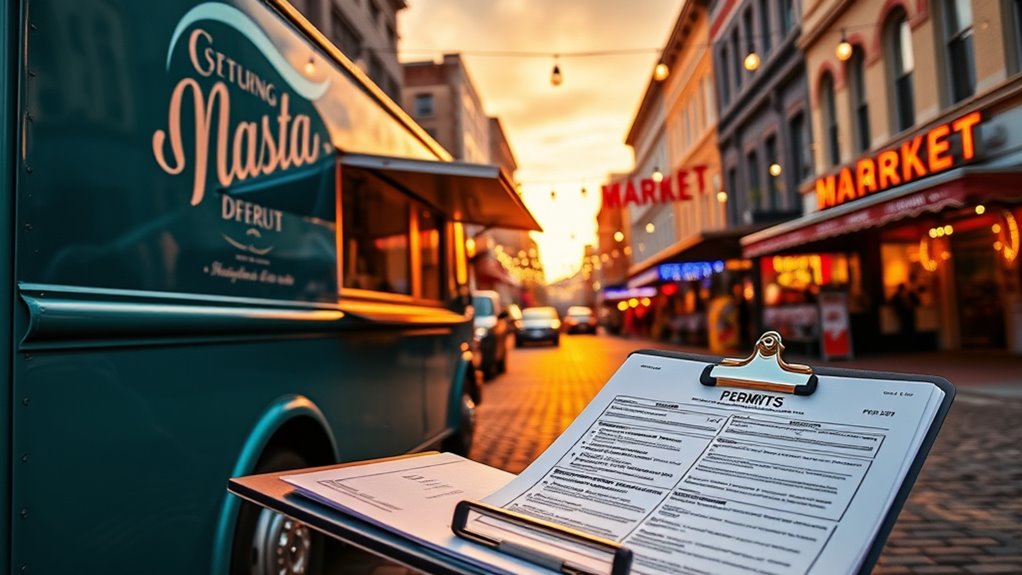
To estimate your food truck launch costs, you need to take into account both startup investments and ongoing expenses. You’ll face upfront costs for the trailer, equipment, permits, and branding, as well as regular costs like inventory, fuel, and maintenance. Planning your budget carefully helps guarantee you’re prepared for all the financial demands of starting and running your Salem food truck. Understanding the typical cost ranges can help you develop a realistic financial plan and avoid unexpected expenses. Additionally, researching cost-effective marketing strategies can maximize your outreach without overspending.
Startup Investment Breakdown
Launching a food truck in Salem, Oregon requires a clear understanding of the initial investment needed to turn your idea into reality. The truck itself can cost between $40,000 and $150,000, depending on new or used, customizations, and leasing options. For coffee trucks or trailers, expect costs from $15,000 to $100,000, with used options around $35,000 to $60,000 excluding equipment. Build-out expenses for kitchen equipment like grills and refrigerators vary widely based on your menu. Initial supplies, including serveware, generally run around $300, but can be higher with menu complexity. Licensing, permits, and insurance add another $1,000 to $2,000 upfront. Don’t forget initial inventory costs, which typically range from $2,000 to $3,000, along with parking and marketing expenses. Startup costs can also be influenced by local regulations and the specific city ordinances in Salem, affecting overall expenses. Additionally, understanding the vegetable juices that can be incorporated into your menu might attract health-conscious customers and boost sales.
Ongoing Operational Expenses
Once you’ve secured your startup costs, understanding the ongoing expenses helps keep your food truck profitable. You’ll face regular costs that keep your business running smoothly. Fuel and maintenance: Expect monthly fuel bills for driving and generator power, plus routine maintenance like oil changes, tire replacements, and occasional repairs. Unplanned breakdowns can be costly and disruptive. Maintaining your truck regularly can help prevent costly repairs down the line. Permits and licenses: Renewing health permits, paying for inspections, and covering event permits can add up annually, with fees varying but generally moderate in Salem. Insurance: You’ll need coverage for your truck, liability, and staff, with premiums paid monthly or yearly to protect against accidents and damages. Ongoing operational expenses include inventory and utilities: Regularly restocking ingredients, paying for water, propane, and cleaning supplies, and investing in marketing keep your operation fresh and visible.
Finding Suitable Locations and Understanding Zoning Rules
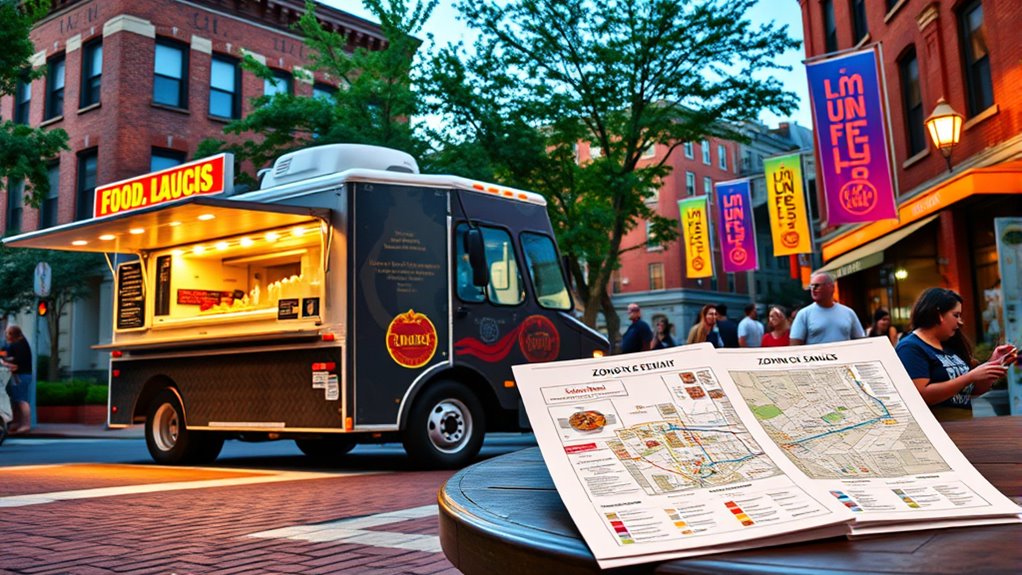
To operate your food truck in Salem, you’ll need to secure permission to use private property or find approved commercial zones. Understanding zoning rules is essential since your truck can only park in designated areas like retail, general, or industrial zones. Make sure to file the necessary site plans and obtain all permits to stay compliant with local regulations. Recent legal changes now allow food trucks to operate in clusters and host rallies, which can influence where you choose to set up. Additionally, understanding the contrast ratio of your setup can improve your visibility during evening events or rallies.
Private Property Permissions
Finding suitable private property locations for your food truck in Salem requires obtaining a formal use agreement with the property owner. This agreement must be written, kept on-site, and available for inspection during operations. It should explicitly grant permission to use the property for mobile food vending. Without it, your permit could be denied or revoked. To visualize, consider:
- A bustling retail plaza with ample frontage and easy access.
- An industrial park with designated parking and clear maneuvering space.
- A large private lot with designated zones for customer parking and truck setup.
- A property owner’s consent letter ensuring compliance with additional restrictions.
- Always verify that the property’s zoning allows food trucks and that the agreement aligns with city regulations, avoiding potential legal issues.
Zoning Compliance Requirements
Identifying a suitable location for your Salem food truck involves understanding the city’s zoning regulations. You must operate within permitted zones like Commercial Retail (CR), Commercial General (CG), Highway Commercial (HC), or industrial districts such as IC, IP, IG, and IH. No food trucks are allowed in residential zones or unlisted commercial or industrial areas. To guarantee compliance, you’ll need to submit a site plan detailing the exact location, dimensions, and layout of your truck, which the Zoning Administrator reviews. Operating on public property is prohibited without explicit approval, so focus on private zones. Zoning regulations specify the types of areas where food trucks can operate legally. Use the table below to clarify permissible zones:
| Allowed Zones | Restrictions |
|---|---|
| CR, CG, HC | Must meet site plan and licensing requirements |
| IC, IP, IG, IH | Must adhere to land use and safety regulations |
| Residential Zones | Not permitted |
| Public Property | Vending restricted; requires permits |
Additionally, understanding the specific permitting process for each zone can help streamline your application.
Managing Menu Regulations and Food Safety Standards
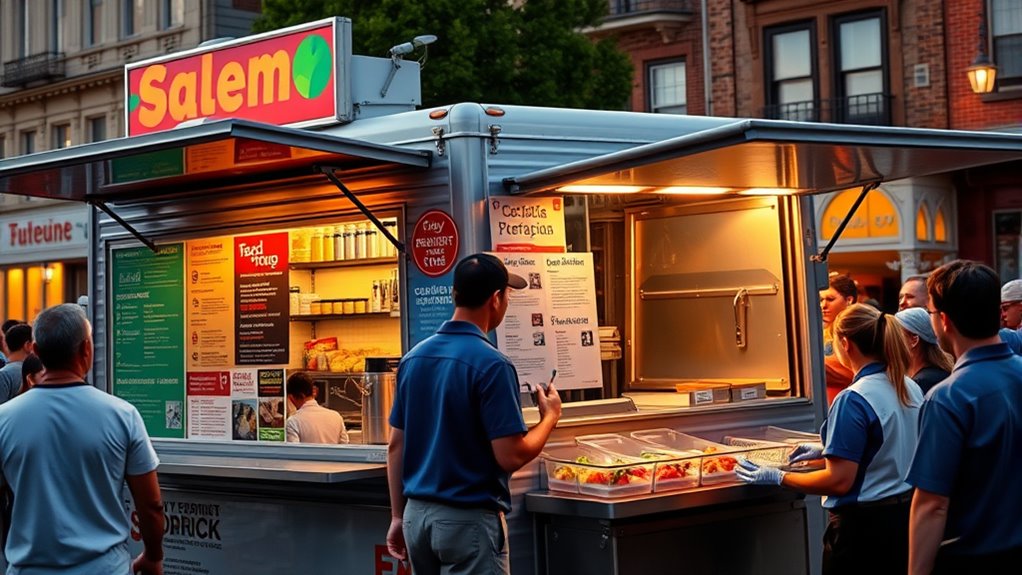
Managing menu regulations and food safety standards for a food truck in Salem, Oregon requires careful adherence to classification-specific rules and thorough planning. You need to understand your unit’s classification—Class I to IV—to determine what foods you can serve.
Understanding your food truck’s classification in Salem, Oregon ensures compliance with safety standards and menu regulations.
For example:
- Visualize a simple setup serving pre-packaged snacks with no cooking.
- Imagine a trailer that keeps hot and cold foods but doesn’t allow customer self-service.
- Picture a unit where you can cook and assemble dishes but can’t prepare raw meats.
- Envision a fully equipped truck cooking raw animal foods on board, offering a broad menu.
You must submit detailed menus and plans for approval, ensuring all food safety protocols—like temperature controls and sanitation—are met before operation. Understanding food safety standards is essential to ensure compliance and protect customers.
Ensuring Health & Safety Compliance for Your Mobile Unit
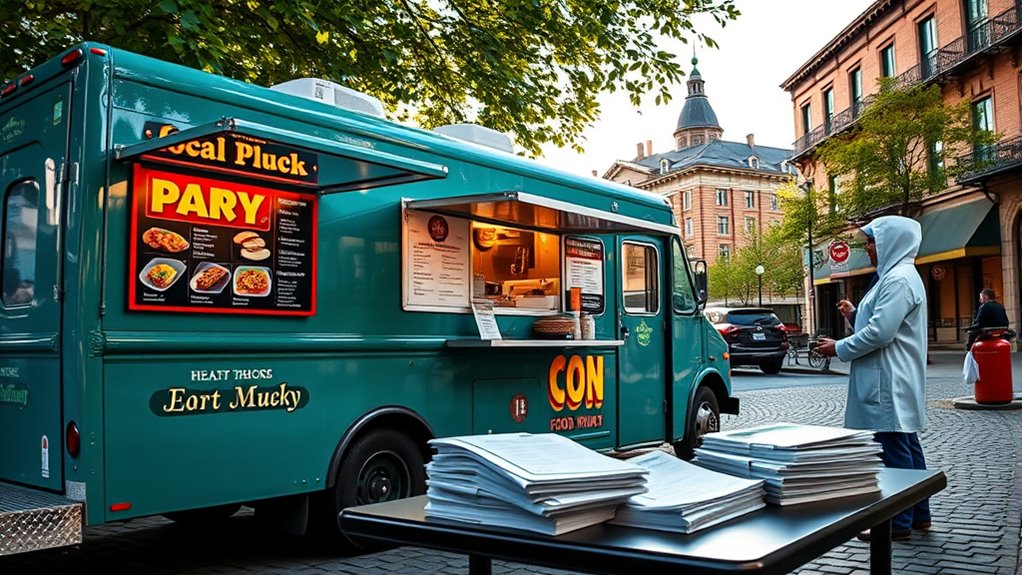
Ensuring health and safety compliance for your mobile unit requires you to proactively follow local regulations, conduct regular inspections, and maintain proper documentation. First, obtain a Mobile Food Unit license from the Salem City Health Department and complete plan reviews with local authorities, including zoning and fire safety. Keep your unit as approved, reverting any unauthorized modifications. Notify health officials if operating outside Salem. Follow Oregon rules for sanitation, guaranteeing all surfaces, equipment, and storage areas are clean and sanitary. Adhere to fire safety codes by installing approved ventilation, securely storing propane, and maintaining safe distances from other units. Regular inspections will monitor safety standards; pass them to keep your permit in good standing. Fire safety regulations should be a priority to prevent hazards. Staying compliant minimizes risks and ensures safe service for your customers.
Developing Effective Marketing and Operational Strategies
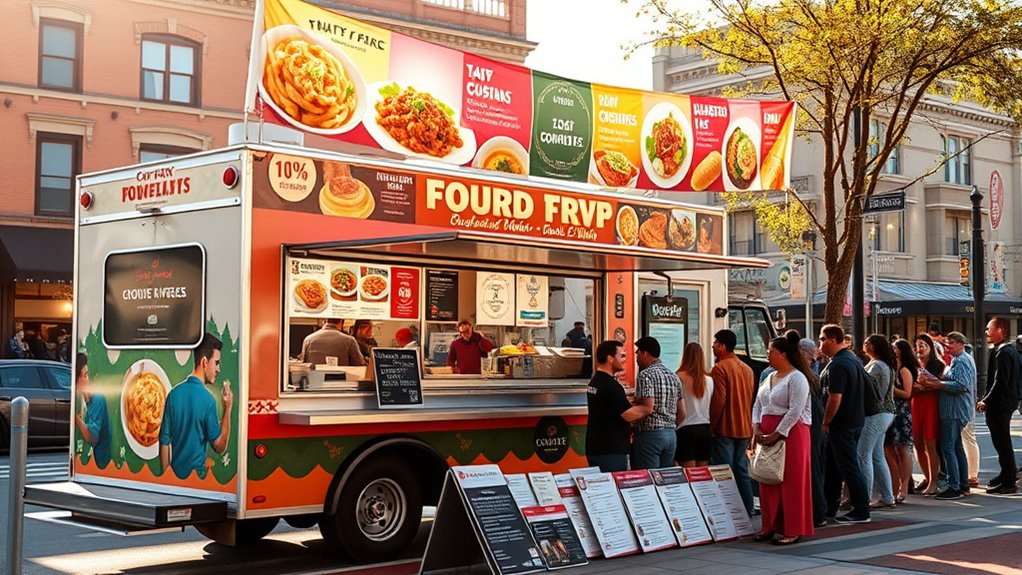
To effectively grow your food truck business, leveraging digital marketing, participating in local events, and utilizing data analytics are essential strategies. Digital platforms like social media help boost visibility—about 68% of owners use it regularly, with Facebook being the most popular. Running targeted campaigns can increase sales by 20%, and mobile apps for locating trucks have seen a 35% rise in downloads. Engaging followers through loyalty programs can lift repeat visits by 30%, while active social media presence boosts customer spending by 15%. Implementing a customer loyalty program can also increase social media reach by 50%, further expanding your brand awareness. Developing a team with AI cybersecurity skills can help protect your online assets and customer data from threats. Imagine these strategies as: 1. Posting vibrant photos and specials on social media. 2. Attending three or more local festivals annually. 3. Tracking customer data for tailored promotions. 4. Partnering with event organizers for extra exposure.
Frequently Asked Questions
How Long Does the Permit Approval Process Typically Take in Salem?
You’re probably wondering how long the permit approval takes in Salem. Usually, if your application is complete and complies with local codes, you can get approval within 1 to 10 days. Incomplete or incorrect applications delay the process. Keep in mind, the full permitting process, including planning and construction, can take 3 to 6 months depending on complexity, but basic permits often move quickly if everything is in order.
Are There Any Restrictions on Operating Hours for Food Trucks in Salem?
You need to know Salem’s operating hours restrictions for food trucks, which are from 7 a.m. to 10 p.m. daily. You can’t vend on public rights-of-way, and operating outside these hours can lead to license issues or penalties. If you operate on private property, you might get more flexibility, but you still need to follow county and city codes. Always guarantee your permits are current to avoid violations.
Can I Operate My Food Truck in Multiple Counties With One License?
Think of your food truck license as a key to different county gates. Unfortunately, you can’t use one key for multiple gates; each county requires its own license. You’ll need to apply separately in each jurisdiction, ensuring your truck meets local health and safety standards. While some counties streamline the process, you must still follow their rules and pay individual fees. Operating without proper licenses risks fines or shutdowns.
What Are the Specific Zoning Restrictions for Street Vending in Salem?
You need to know Salem’s zoning restrictions for street vending. You can’t operate on public streets or rights-of-way unless during approved community events. Street vending on sidewalks requires a specific business license in commercial zones. Mobile food units must stay on private property in permitted zones like CR, CG, HC, IC, IP, IG, or IH. Operating outside these zones or on public streets without approval is illegal and can lead to enforcement actions.
Are There Grants or Financial Assistance Programs Available for New Food Truck Owners?
Think of finding grants like searching for hidden treasure; there are opportunities out there for new food truck owners. You can explore programs from Oregon’s Community Food System Network, Business Oregon, and local cities offering small business loans or grants. Nonprofits like Oregon Community Foundation and BFM Fund also provide mentorship and funding. While direct grants may be limited, these resources can help you fuel your food truck journey and turn your dream into reality.
Conclusion
Starting your Salem food truck journey requires diligent diligence and strategic planning. By mastering permits, managing menus, and marketing methods, you’ll create a mesmerizing culinary carriage. With careful compliance and creative campaigns, you’ll conquer city corners and carve your niche. Remember, your passion, persistence, and preparation pave the path to success. So, gear up, gather your grit, and get ready to grow your flavorful footprint in Salem’s vibrant food scene. Your delicious destiny awaits!


